
Mountains of duck manure
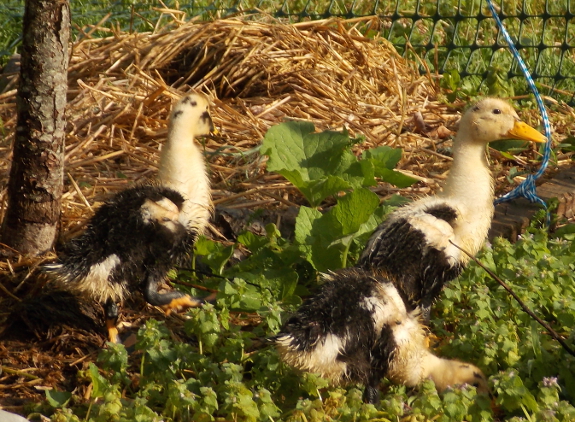
One week after moving the ducklings into a pasture,
they had devastated the entire area (about 200 square feet) and had to
be moved to a new spot. For the sake of comparison, 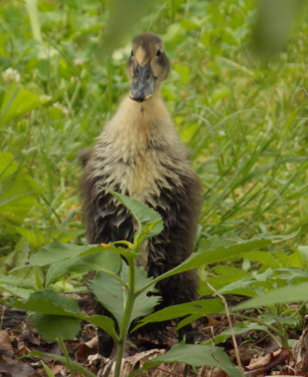 chicks of this age would have caused a lot less impact, but chicks of this size
would have done about the same, only in different patterns. (Our
Ancona ducks grow a lot faster than Australorp chicks, thus the size and
age distinction.)
chicks of this age would have caused a lot less impact, but chicks of this size
would have done about the same, only in different patterns. (Our
Ancona ducks grow a lot faster than Australorp chicks, thus the size and
age distinction.)
While chickens peck and scratch, most of the impact of ducks seems to
come in the form of wet manure. Sure, our ducklings ate some of the greenery, but
the real reason I moved them so quickly is because their little paddock
was beginning to smell due to too much manure in one spot.
The worst of the manure buildup was in the open-bottomed brooder.
I ended up
pulling the brooder to a new spot every day the way I do with a chicken
tractor rather than trying to lay
down fresh bedding because ducklings don't mind sleeping on the damp
ground, and they make so much manure I'd be using up lots of straw or
leaves to soak it up. The only downside was that, after a few
days, most of the pasture was piles of duck manure from where I'd moved
the brooder over those spots.
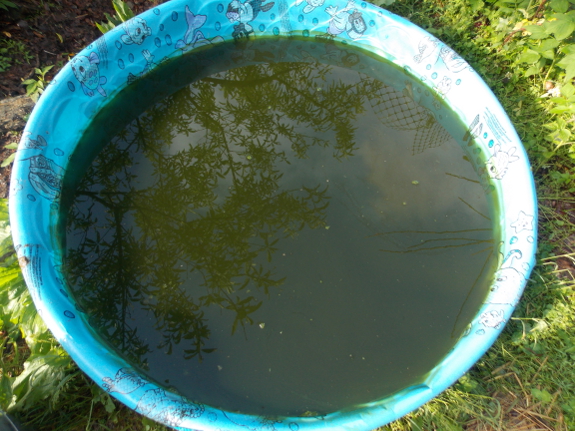
The other spot duck manure lands is in their dabbling pond. We put a little kiddie pool with some duckweed in it in the new location,
and the ducks quickly turned the clear water into pea soup (or is that
duck soup?). This is a spot where I need to put on my permaculture
thinking-cap since the high-nitrogen water in the duck pond would be a
perfect fertilizer for the garden, but it takes quite a while to move
that water one bucket at a time. Maybe if we had a little pump
(and if it hadn't rained two inches the night before I wanted to empty
the pond), I could have utilized both the fertilizer value and the water
more efficiently.
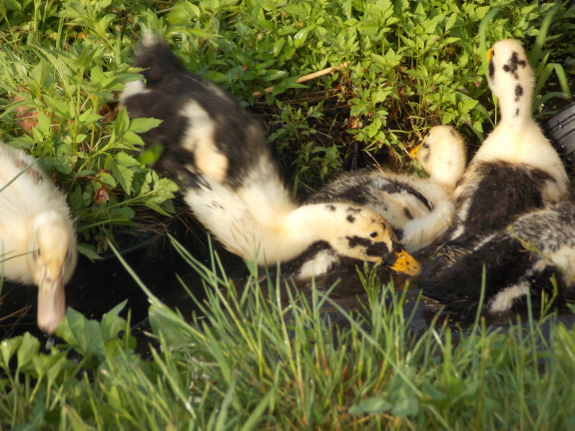
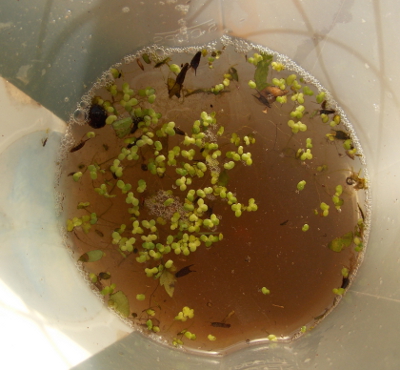 The
photo above shows our ducklings enjoying the next pond in the
rotation. This one is tiny, barely big enough for nine growing
ducklings to float in at the same time. I scooped out a bit of
duckweed and pond inoculant to seed the kiddie pool before turning the
ducks loose in their new pond, but I'm already learning that it takes
much more than a week or two for a pond to grow enough life that the
ducks don't demolish it in the first five minutes. I definitely
need to build more sky ponds for the long-term cultivation of aquatic
life if we want to keep ducks.
The
photo above shows our ducklings enjoying the next pond in the
rotation. This one is tiny, barely big enough for nine growing
ducklings to float in at the same time. I scooped out a bit of
duckweed and pond inoculant to seed the kiddie pool before turning the
ducks loose in their new pond, but I'm already learning that it takes
much more than a week or two for a pond to grow enough life that the
ducks don't demolish it in the first five minutes. I definitely
need to build more sky ponds for the long-term cultivation of aquatic
life if we want to keep ducks.
Want more in-depth information? Browse through our books.
Or explore more posts by date or by subject.
About us: Anna Hess and Mark Hamilton spent over a decade living self-sufficiently in the mountains of Virginia before moving north to start over from scratch in the foothills of Ohio. They've experimented with permaculture, no-till gardening, trailersteading, home-based microbusinesses and much more, writing about their adventures in both blogs and books.
Want to be notified when new comments are posted on this page? Click on the RSS button after you add a comment to subscribe to the comment feed, or simply check the box beside "email replies to me" while writing your comment.

I guess the ducks are lots more work. Reminds me of the "dozen diapers a day" myth.
You might need to scoop up the poop anad dry it out, as duck chips, and save it as fuel...? You also might need to fence off part of the creek on both sides, or move the whole duck operation down toy a paddock in the swamp?
Somehow this triggers a memory of a poem about a farmer who for want of X purchased Y and for want of Z for the Y purchased A and for want of D for the A purchased.
Replace purchased with "added to the farm" I dunno where I get that memory but somehow it is there without specifics. For want of Duckweed Anna made a skypond. For want of Fertilizer
we should have a modern version showing the links between the resources on your farm, properly illustrated as a children's version of farming these days with integrated systems.
Interesting thoughts from Mom, c., and Emily!
Terry --- Are there duck breeds that don't love open water? From the few books I've read on the topic, it seems like all ducks love it.... (None really need it, but that's another story.)
The more serious answer about duck breed selection is in this post.
I guess I was thinking of Indian Runners. Don't get me wrong, I love what you have there---I was just alarmed by the extensive amount of land "damaged," though I guess as long as they are moved, it will be a plus in the end.
"Indian Runners These ducks are perhaps the closest thing you can get to a walking wine bottle, voted Omlets\' favourite duck not because we like wine bottles but because they are so funny to watch running around. They are used by shepherds to train puppy sheep dogs because they act the same as a herd of sheep. Runner ducks lay between 150 and 300 eggs per year and aren\'t really a swimming duck so don\'t need very much water making them a good garden duck."
I guess I'm just surprised that they seem to be more work than chickens. I thought ducks were supposed to be easier---showing my ignorance here. But then, that should change as they get older.
I think what surprised me is to learn that they will NEED more pond space in order to not decimate the healthy growth/balance. But as you say, they are ducks! I shouldn't think of getting ducks without supplying what their nature requires.